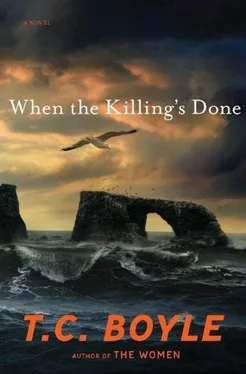Alma murmurs something in response, and then they’re striding across the courtyard, past the entrance to the auditorium and up to the door of the room where the unlucky grizzly ( Ursus arctos californicus , declared extinct 1924) stands guard. “But all these cars — this isn’t all for me, is it?”
“I don’t know who else,” Frieda throws over her shoulder, bending from the waist to manipulate a clutch of keys and let her into the cold too-bright room, brisk now, hugging her arms to her and revolving around the floor on the spongy soles of her running shoes as if she’s about to dash off into the night. She’s anxious, Alma can see that, anxious because of the size of the crowd and the subject matter and what happened in Ventura last week. “But you have everything you need, right? There’s water out there on the podium — and we’ll start a little late, I think, maybe ten minutes or so, just to let everyone get settled, what with the rain—”
“Yes,” Alma murmurs, “that’s fine. “I’ll just need to plug my laptop into the projector. And the microphone—”
“I did the sound check myself. You’ll take questions afterward?”
The grizzly, formerly on display but exiled to this back room for crimes unspecified, looms over them with its plasticized eyes and arrested teeth, snarling mutely down the ages. There are other artifacts here too — a great stiff comb of baleen propped up in the corner, cast-off mammoth bones aligned neatly on an oak desk and looking unsettlingly like the refuse at the bottom of a Colonel Sanders bucket enlarged to implausibility, Chumash arrowheads and shards of pottery in a dusty glass display case skewed away from the far wall at a forty-five-degree angle, museum clutter awaiting the donors’ dollars to rescue it from eternal storage. “Yes. I mean, that’s what they’re here for. Most of them, I guess.”
Frieda gives her a look. “If any of them get, well — I don’t know, contentious —don’t be afraid to cut them off, and I do have Bill Braithwaite at the door, just in case. .”
This is the point at which she’s supposed to say, Don’t worry, I can handle it — I’ve done it a thousand times . But she says nothing.
Erect, her glasses shining and her pigeon-colored eyes in retreat, Frieda claps her hands together and spins halfway round with a faint squeak of rubber or plastic or whatever it is they’re making running shoes from these days. “Well, I guess I’ll leave you to your thoughts then. I’ll come get you in”—she raises her wrist to squint at a flat gold watch on a band no wider than a shoelace—“say, seven and a half minutes?”
It’s warm in the auditorium, very warm, all those people — standing room only, which means three hundred at least — bundled tightly together, post-prandial, variously digesting their dinners, processing proteins and starches and sugars, generating heat. And it’s humid, the rain beating remorselessly at the roof and percolating through the downspouts with a peristaltic tick and gurgle. And, of course, since it’s November, the museum’s central air has been long shut down for the season. Sitting there in the middle of the front row while Frieda reads through a list of announcements — upcoming events, classes, fund-raisers, opportunities to get in on museum-sponsored field trips, films and slide shows — she can feel the sweat rising from her pores, collecting at the nape of her neck beneath the thermal blanket of her hair, trailing down her spine to where the blouse has begun to stick to the small of her back. When she slipped in stage left and took her seat, she caught a glimpse of the crowd, surprised all over again by the turnout, especially on a rainy night, but she didn’t look closely enough to individuate anyone, not even Tim, who must have been part of the contingent, mostly male, milling around in the rear without hope of finding seats. If she was nervous a few moments ago, in the green room with Frieda — and the grizzly — she’s over it now. In fact, all she can think of — hope for — is that Frieda’s introduction will be short and to the point so she can get up there and get this over with.
But Frieda is not short and to the point. After a shaky start, Frieda is coming into her own, riding high on the heady business of insinuating a single human voice through the wires of a foam-jacketed microphone and the distant speakers they feed in order to hold the attention of three hundred people without lapsing or slipping up or making a fool of yourself. The introduction — Alma Boyd Takesue, B.S. in biology from the University of Hawaii, M.S. and Ph.D. in environmental studies from UC Berkeley, three years in the field studying the brown tree snake on Guam and all the rest, right on down to a recitation of the titles of her papers in scientific journals, all of them, all the journals and all the titles — manages to be both uninspired and interminable, and by the time Frieda finally announces her and stands back to shield her eyes against the spotlight and extend a blind hand of welcome, the audience is restless. The applause patters dutifully as Alma rises from her seat and then cuts off abruptly, even before she finds herself up there under the glare of the spotlight, struggling to adjust the microphone the taller woman has left poised well above the crown of her head.
“Hello,” she hears herself say, the amplification hurling her voice out into the void and then bringing it back to inhabit every crevice in a throbbing overwrought vibrato. “I want to thank you all for coming, especially on such a”—and here she pauses, searching for the right word, the one that will soften things, lighten them up, and what kind of night is it anyway? — “dismal night.” Yes, dismal. There is a collective rustling, as if the entire audience were balanced on a taut continuous sheet of paper, and then she’s bending to her computer, and the first image — of Anacapa at twilight, Arch Rock glowing iconically and the sea so multifaceted and calm it might have been painted in oils around it — infuses the big screen behind her. “This is Anacapa,” she says redundantly, “one of the islands that comprise the Channel Islands National Park, the islands often referred to as the Galápagos of North America.”
The Galápagos of North America . It’s a tired phrase, but one she conscientiously works into all her press releases and talks, whether formal or informal, because it never fails to have its effect, people drifting off on a fugue of National Geographic specials, of blue-footed boobies, frigate birds, vampire finches and marine iguanas presented in loving close-up while azure waves beat at crinkled shores, only to awaken to the connection she’s trying to make — that these islands, our islands, are equally unique. And equally worthy of preservation. And not simply preservation, but restoration.
She lifts her head to gaze out on the audience, sweeping left to right as if she’s speaking personally to each and every one of them, though with the spotlight in her eyes and her glasses on the podium beside her and the auditorium lights turned low, she can barely make out anyone beyond the second row. “Anacapa,” she pronounces, giving each of its aspirated syllables a long lingering beat, “is, as I’m sure you all know, a unique and irreplaceable ecosystem that is home to endemic species of both plants and animals found nowhere else in the world, from the island wallflower and an autochthonous Malacothrix , of the chicory genus, to the shield-backed cricket and the native deer mouse, Peromyscus maniculatus anacapae , just as the other islands harbor unique species of birds, as well as the spotted skunk and”—here a click of the mechanical mouse to display the next picture, one that never fails to arouse a tongue-clucking murmur of approval—“the island fox. Which, through some sixteen thousand years of separation from the mainland, has evolved into a separate subspecies, featuring the dwarfism often common to insular populations. On average”—she looks to the screen behind her, the fox blooming in the darkness, ears erect, paws neatly aligned and gazing out into the audience with all the ferocity of a stuffed toy—“these little guys weigh four to six pounds, the size of a house cat. . one that gets regular exercise, that is.” This last, her icebreaker, always generates the first laugh of the evening, or rueful chuckle, at least, as the cat owners reflect on the overfed, kibbleized giants curled up asleep on the sofa at home.
Читать дальше












